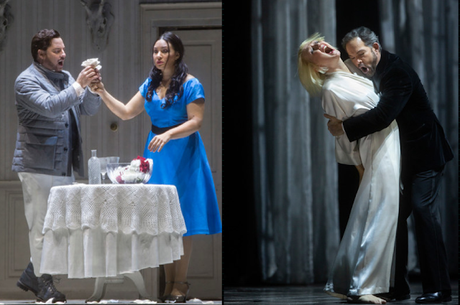by Paul J. Pelkonen

Two sides of marriage. Left, Matthew Polenzani and Sonya Yoncheva in Iolanta. Right, Angela Denoke and Gerald
Finley as Mr. and Mrs. Bluebeard. Photos by Marty Sohl © 2019 The Metropolitan Opera. Collage by the author.
So why did Mr. Trelinskyh decide to pair these two operas? Each explores the ideas of courtship. Iolanta pairs an imprisoned, blind princess with an eager young knight: his love is one of the factors in curing her affliction. Presumably her fate is to get married and live a happy, fulfilling major-key existence. Bluebeard is the morning after, with the new couple moving into the husband's deeply creepy house. Bartók offers a portrait of a marriage that seems ideal but is ultimately doomed, since the husband is a serial killer with three undead dead wives kept cooped up in his dark, forbidding house.
The staging (designed by Boris Kudlicka) is dark and bleak. The only light comes from projections (the designer is Bartek Macias) which appear to liberal effect on black surfaces, curtains and scrims. to create the tangled forest around Iolanta's lonely dwelling, and the even more forbidding landscapes inside Bluebeard's house. Thorny thickets, gloomy torture chambers and a seemingly infinite elevator shaft dominate the action. This last forces the soloists to sing from a platform high above stage left, creating an odd and disturbing balance of sound with the orchestra.
This year, Iolanta stars Russian soprano Sonya Yoncheva, who has risen rapidly to prominence in recent seasons. She played the princess with an engaging naivete, never overacting her handicap and letting her voice ride over Tchaikovsky's orchestra. However, the short opera allows little in the way of character development, and the production cuts rapidly between the lonely Iolanta and the ambitious young knight Vaudémont, who ends up rescuing her from her father's despotic, but benevolent domain.
Her paramour was played by Matthew Polenzani, recovered at this performance from a cold that caused him to miss last week's opener. The tenor showed a ringing top and effective command of the Russian text. Far better was Alexey Markov as his friend and rival Robert, whose singing got the first real applause of the night. This set off a chain of melodic and memorable Tchaikovsky themes, as the composer showed his mastery of spinning a good tune. The only complaint--and this is an odd one in a one-act opera--is that the action following Iolanta's first kiss with Vaudémont seemed protracted, a long coda after the work's emotional climax.
Much of the audience, eager see La Yoncheva, scarpered before Bluebeard's Castle started. There were technical glitches here. The menacing Hungarian voice-over that starts the opera (originally delivered by a nameless narrator) seemed to fall silent as the MET Titles continued. An eerie silence, and then conductor Henrik Nanasi led the listener into the bleak, dark world of Bluebeard. However, as the action progressed, one was unsure of exactly how Mr. Trelinski had re-interpreted the opera. Was it all in Judith's head? Was she dead, killed in the grave seen at the start of the opera? Was she in fact insane and not married at all? One simply isn't sure what was intended.
Gerald Finley brought his taut baritone with its warm, bassy, burry edge to the role of Bluebeard. He seemed to push at times, as the role lies low in his range. A bigger problem was the director's choice to have Bluebeard offstage frequently, delivering some lines amplified. As his (latest) wife Judith soprano Angela Denoke paraded through a series of strange settings, her sharp, sword-like soprano rising in panic and pitch. She visited a bloody "kill room" out of Dexter (the first and second doors) a bathtub scene (the third door) with Judith in the tub, redolent of Room 237 in Stanley Kubrick's The Shining. The elevator finally brought her to an all-white cell (the sixth door.) In the end, she sank to her knees before her own grave as Bluebeard sang of her eternal glory and his other wives danced silently through the cavernous set. Marriage, it seems doesn't always work out.
If you enjoyed this article, it's time to click over to Superconductor's Patreon page, and help support the cost of independent music journalism in New York City at the low cost of just $5/month.

